- Home
- G. K. Chesterton
The Innocence of Father Brown Page 4
The Innocence of Father Brown Read online
Page 4
The Flying Stars
"The most beautiful crime I ever committed," Flambeau would say in hishighly moral old age, "was also, by a singular coincidence, my last.It was committed at Christmas. As an artist I had always attempted toprovide crimes suitable to the special season or landscapes in which Ifound myself, choosing this or that terrace or garden for a catastrophe,as if for a statuary group. Thus squires should be swindled in longrooms panelled with oak; while Jews, on the other hand, should ratherfind themselves unexpectedly penniless among the lights and screens ofthe Cafe Riche. Thus, in England, if I wished to relieve a dean of hisriches (which is not so easy as you might suppose), I wished to framehim, if I make myself clear, in the green lawns and grey towers of somecathedral town. Similarly, in France, when I had got money out of a richand wicked peasant (which is almost impossible), it gratified me to gethis indignant head relieved against a grey line of clipped poplars,and those solemn plains of Gaul over which broods the mighty spirit ofMillet.
"Well, my last crime was a Christmas crime, a cheery, cosy, Englishmiddle-class crime; a crime of Charles Dickens. I did it in a good oldmiddle-class house near Putney, a house with a crescent of carriagedrive, a house with a stable by the side of it, a house with the nameon the two outer gates, a house with a monkey tree. Enough, you know thespecies. I really think my imitation of Dickens's style was dexterousand literary. It seems almost a pity I repented the same evening."
Flambeau would then proceed to tell the story from the inside; andeven from the inside it was odd. Seen from the outside it was perfectlyincomprehensible, and it is from the outside that the stranger muststudy it. From this standpoint the drama may be said to have begun whenthe front doors of the house with the stable opened on the garden withthe monkey tree, and a young girl came out with bread to feed the birdson the afternoon of Boxing Day. She had a pretty face, with brave browneyes; but her figure was beyond conjecture, for she was so wrapped up inbrown furs that it was hard to say which was hair and which was fur. Butfor the attractive face she might have been a small toddling bear.
The winter afternoon was reddening towards evening, and already a rubylight was rolled over the bloomless beds, filling them, as it were, withthe ghosts of the dead roses. On one side of the house stood the stable,on the other an alley or cloister of laurels led to the larger gardenbehind. The young lady, having scattered bread for the birds (forthe fourth or fifth time that day, because the dog ate it), passedunobtrusively down the lane of laurels and into a glimmering plantationof evergreens behind. Here she gave an exclamation of wonder, real orritual, and looking up at the high garden wall above her, beheld itfantastically bestridden by a somewhat fantastic figure.
"Oh, don't jump, Mr. Crook," she called out in some alarm; "it's muchtoo high."
The individual riding the party wall like an aerial horse was a tall,angular young man, with dark hair sticking up like a hair brush,intelligent and even distinguished lineaments, but a sallow and almostalien complexion. This showed the more plainly because he wore anaggressive red tie, the only part of his costume of which he seemed totake any care. Perhaps it was a symbol. He took no notice of the girl'salarmed adjuration, but leapt like a grasshopper to the ground besideher, where he might very well have broken his legs.
"I think I was meant to be a burglar," he said placidly, "and I have nodoubt I should have been if I hadn't happened to be born in that nicehouse next door. I can't see any harm in it, anyhow."
"How can you say such things!" she remonstrated.
"Well," said the young man, "if you're born on the wrong side of thewall, I can't see that it's wrong to climb over it."
"I never know what you will say or do next," she said.
"I don't often know myself," replied Mr. Crook; "but then I am on theright side of the wall now."
"And which is the right side of the wall?" asked the young lady,smiling.
"Whichever side you are on," said the young man named Crook.
As they went together through the laurels towards the front gardena motor horn sounded thrice, coming nearer and nearer, and a car ofsplendid speed, great elegance, and a pale green colour swept up to thefront doors like a bird and stood throbbing.
"Hullo, hullo!" said the young man with the red tie, "here's somebodyborn on the right side, anyhow. I didn't know, Miss Adams, that yourSanta Claus was so modern as this."
"Oh, that's my godfather, Sir Leopold Fischer. He always comes on BoxingDay."
Then, after an innocent pause, which unconsciously betrayed some lack ofenthusiasm, Ruby Adams added:
"He is very kind."
John Crook, journalist, had heard of that eminent City magnate; andit was not his fault if the City magnate had not heard of him; for incertain articles in The Clarion or The New Age Sir Leopold had beendealt with austerely. But he said nothing and grimly watched theunloading of the motor-car, which was rather a long process. A large,neat chauffeur in green got out from the front, and a small, neatmanservant in grey got out from the back, and between them theydeposited Sir Leopold on the doorstep and began to unpack him, like somevery carefully protected parcel. Rugs enough to stock a bazaar, fursof all the beasts of the forest, and scarves of all the colours ofthe rainbow were unwrapped one by one, till they revealed somethingresembling the human form; the form of a friendly, but foreign-lookingold gentleman, with a grey goat-like beard and a beaming smile, whorubbed his big fur gloves together.
Long before this revelation was complete the two big doors of the porchhad opened in the middle, and Colonel Adams (father of the furry younglady) had come out himself to invite his eminent guest inside. He was atall, sunburnt, and very silent man, who wore a red smoking-cap like afez, making him look like one of the English Sirdars or Pashas in Egypt.With him was his brother-in-law, lately come from Canada, a big andrather boisterous young gentleman-farmer, with a yellow beard, by nameJames Blount. With him also was the more insignificant figure of thepriest from the neighbouring Roman Church; for the colonel's late wifehad been a Catholic, and the children, as is common in such cases, hadbeen trained to follow her. Everything seemed undistinguished aboutthe priest, even down to his name, which was Brown; yet the colonel hadalways found something companionable about him, and frequently asked himto such family gatherings.
In the large entrance hall of the house there was ample room even forSir Leopold and the removal of his wraps. Porch and vestibule, indeed,were unduly large in proportion to the house, and formed, as it were, abig room with the front door at one end, and the bottom of the staircaseat the other. In front of the large hall fire, over which hung thecolonel's sword, the process was completed and the company, includingthe saturnine Crook, presented to Sir Leopold Fischer. That venerablefinancier, however, still seemed struggling with portions of hiswell-lined attire, and at length produced from a very interior tail-coatpocket, a black oval case which he radiantly explained to be hisChristmas present for his god-daughter. With an unaffected vain-glorythat had something disarming about it he held out the case before themall; it flew open at a touch and half-blinded them. It was just as if acrystal fountain had spurted in their eyes. In a nest of orange velvetlay like three eggs, three white and vivid diamonds that seemed to setthe very air on fire all round them. Fischer stood beaming benevolentlyand drinking deep of the astonishment and ecstasy of the girl, the grimadmiration and gruff thanks of the colonel, the wonder of the wholegroup.
"I'll put 'em back now, my dear," said Fischer, returning the case tothe tails of his coat. "I had to be careful of 'em coming down. They'rethe three great African diamonds called 'The Flying Stars,' becausethey've been stolen so often. All the big criminals are on the track;but even the rough men about in the streets and hotels could hardly havekept their hands off them. I might have lost them on the road here. Itwas quite possible."
"Quite natural, I should say," growled the man in the red tie. "Ishouldn't blame 'em if they had taken 'em. When they ask for bread, andyou don't even give them a stone, I think they might take the
stone forthemselves."
"I won't have you talking like that," cried the girl, who was in acurious glow. "You've only talked like that since you became a horridwhat's-his-name. You know what I mean. What do you call a man who wantsto embrace the chimney-sweep?"
"A saint," said Father Brown.
"I think," said Sir Leopold, with a supercilious smile, "that Ruby meansa Socialist."
"A radical does not mean a man who lives on radishes," remarked Crook,with some impatience; "and a Conservative does not mean a man whopreserves jam. Neither, I assure you, does a Socialist mean a man whodesires a social evening with the chimney-sweep. A Socialist means aman who wants all the chimneys swept and all the chimney-sweeps paid forit."
"But who won't allow you," put in the priest in a low voice, "to ownyour own soot."
Crook looked at him with an eye of interest and even respect. "Does onewant to own soot?" he asked.
"One might," answered Brown, with speculation in his eye. "I've heardthat gardeners use it. And I once made six children happy at Christmaswhen the conjuror didn't come, entirely with soot--applied externally."
"Oh, splendid," cried Ruby. "Oh, I wish you'd do it to this company."
The boisterous Canadian, Mr. Blount, was lifting his loud voice inapplause, and the astonished financier his (in some considerabledeprecation), when a knock sounded at the double front doors. The priestopened them, and they showed again the front garden of evergreens,monkey-tree and all, now gathering gloom against a gorgeous violetsunset. The scene thus framed was so coloured and quaint, like a backscene in a play, that they forgot a moment the insignificant figurestanding in the door. He was dusty-looking and in a frayed coat,evidently a common messenger. "Any of you gentlemen Mr. Blount?" heasked, and held forward a letter doubtfully. Mr. Blount started, andstopped in his shout of assent. Ripping up the envelope with evidentastonishment he read it; his face clouded a little, and then cleared,and he turned to his brother-in-law and host.
"I'm sick at being such a nuisance, colonel," he said, with the cheerycolonial conventions; "but would it upset you if an old acquaintancecalled on me here tonight on business? In point of fact it's Florian,that famous French acrobat and comic actor; I knew him years ago outWest (he was a French-Canadian by birth), and he seems to have businessfor me, though I hardly guess what."
"Of course, of course," replied the colonel carelessly--"My dear chap,any friend of yours. No doubt he will prove an acquisition."
"He'll black his face, if that's what you mean," cried Blount, laughing."I don't doubt he'd black everyone else's eyes. I don't care; I'm notrefined. I like the jolly old pantomime where a man sits on his tophat."
"Not on mine, please," said Sir Leopold Fischer, with dignity.
"Well, well," observed Crook, airily, "don't let's quarrel. There arelower jokes than sitting on a top hat."
Dislike of the red-tied youth, born of his predatory opinions andevident intimacy with the pretty godchild, led Fischer to say, in hismost sarcastic, magisterial manner: "No doubt you have found somethingmuch lower than sitting on a top hat. What is it, pray?"
"Letting a top hat sit on you, for instance," said the Socialist.
"Now, now, now," cried the Canadian farmer with his barbarianbenevolence, "don't let's spoil a jolly evening. What I say is, let'sdo something for the company tonight. Not blacking faces or sitting onhats, if you don't like those--but something of the sort. Why couldn'twe have a proper old English pantomime--clown, columbine, and so on. Isaw one when I left England at twelve years old, and it's blazed in mybrain like a bonfire ever since. I came back to the old countryonly last year, and I find the thing's extinct. Nothing but a lot ofsnivelling fairy plays. I want a hot poker and a policeman made intosausages, and they give me princesses moralising by moonlight, BlueBirds, or something. Blue Beard's more in my line, and him I like bestwhen he turned into the pantaloon."
"I'm all for making a policeman into sausages," said John Crook. "It's abetter definition of Socialism than some recently given. But surely theget-up would be too big a business."
"Not a scrap," cried Blount, quite carried away. "A harlequinade's thequickest thing we can do, for two reasons. First, one can gag to anydegree; and, second, all the objects are household things--tables andtowel-horses and washing baskets, and things like that."
"That's true," admitted Crook, nodding eagerly and walking about."But I'm afraid I can't have my policeman's uniform? Haven't killed apoliceman lately."
Blount frowned thoughtfully a space, and then smote his thigh. "Yes,we can!" he cried. "I've got Florian's address here, and he knows everycostumier in London. I'll phone him to bring a police dress when hecomes." And he went bounding away to the telephone.
"Oh, it's glorious, godfather," cried Ruby, almost dancing. "I'll becolumbine and you shall be pantaloon."
The millionaire held himself stiff with a sort of heathen solemnity. "Ithink, my dear," he said, "you must get someone else for pantaloon."
"I will be pantaloon, if you like," said Colonel Adams, taking his cigarout of his mouth, and speaking for the first and last time.
"You ought to have a statue," cried the Canadian, as he came back,radiant, from the telephone. "There, we are all fitted. Mr. Crook shallbe clown; he's a journalist and knows all the oldest jokes. I canbe harlequin, that only wants long legs and jumping about. My friendFlorian 'phones he's bringing the police costume; he's changing on theway. We can act it in this very hall, the audience sitting on thosebroad stairs opposite, one row above another. These front doors can bethe back scene, either open or shut. Shut, you see an English interior.Open, a moonlit garden. It all goes by magic." And snatching a chancepiece of billiard chalk from his pocket, he ran it across the hallfloor, half-way between the front door and the staircase, to mark theline of the footlights.
How even such a banquet of bosh was got ready in the time remaineda riddle. But they went at it with that mixture of recklessness andindustry that lives when youth is in a house; and youth was in thathouse that night, though not all may have isolated the two faces andhearts from which it flamed. As always happens, the invention grewwilder and wilder through the very tameness of the bourgeois conventionsfrom which it had to create. The columbine looked charming in anoutstanding skirt that strangely resembled the large lamp-shade in thedrawing-room. The clown and pantaloon made themselves white with flourfrom the cook, and red with rouge from some other domestic, who remained(like all true Christian benefactors) anonymous. The harlequin, alreadyclad in silver paper out of cigar boxes, was, with difficulty, preventedfrom smashing the old Victorian lustre chandeliers, that he might coverhimself with resplendent crystals. In fact he would certainly have doneso, had not Ruby unearthed some old pantomime paste jewels she had wornat a fancy dress party as the Queen of Diamonds. Indeed, her uncle,James Blount, was getting almost out of hand in his excitement; he waslike a schoolboy. He put a paper donkey's head unexpectedly on FatherBrown, who bore it patiently, and even found some private manner ofmoving his ears. He even essayed to put the paper donkey's tail to thecoat-tails of Sir Leopold Fischer. This, however, was frowned down."Uncle is too absurd," cried Ruby to Crook, round whose shoulders shehad seriously placed a string of sausages. "Why is he so wild?"
"He is harlequin to your columbine," said Crook. "I am only the clownwho makes the old jokes."
"I wish you were the harlequin," she said, and left the string ofsausages swinging.
Father Brown, though he knew every detail done behind the scenes,and had even evoked applause by his transformation of a pillow into apantomime baby, went round to the front and sat among the audiencewith all the solemn expectation of a child at his first matinee. Thespectators were few, relations, one or two local friends, and theservants; Sir Leopold sat in the front seat, his full and stillfur-collared figure largely obscuring the view of the little clericbehind him; but it has never been settled by artistic authoritieswhether the cleric lost much. The pantomime was utterly chaotic, yet notcontemptible; there ran thro
ugh it a rage of improvisation which camechiefly from Crook the clown. Commonly he was a clever man, and he wasinspired tonight with a wild omniscience, a folly wiser than the world,that which comes to a young man who has seen for an instant a particularexpression on a particular face. He was supposed to be the clown, buthe was really almost everything else, the author (so far as there was anauthor), the prompter, the scene-painter, the scene-shifter, and, aboveall, the orchestra. At abrupt intervals in the outrageous performancehe would hurl himself in full costume at the piano and bang out somepopular music equally absurd and appropriate.
The climax of this, as of all else, was the moment when the two frontdoors at the back of the scene flew open, showing the lovely moonlitgarden, but showing more prominently the famous professional guest; thegreat Florian, dressed up as a policeman. The clown at the piano playedthe constabulary chorus in the "Pirates of Penzance," but it was drownedin the deafening applause, for every gesture of the great comic actorwas an admirable though restrained version of the carriage and mannerof the police. The harlequin leapt upon him and hit him over the helmet;the pianist playing "Where did you get that hat?" he faced about inadmirably simulated astonishment, and then the leaping harlequin hit himagain (the pianist suggesting a few bars of "Then we had another one").Then the harlequin rushed right into the arms of the policeman and fellon top of him, amid a roar of applause. Then it was that the strangeactor gave that celebrated imitation of a dead man, of which the famestill lingers round Putney. It was almost impossible to believe that aliving person could appear so limp.
The athletic harlequin swung him about like a sack or twisted or tossedhim like an Indian club; all the time to the most maddeningly ludicroustunes from the piano. When the harlequin heaved the comic constableheavily off the floor the clown played "I arise from dreams of thee."When he shuffled him across his back, "With my bundle on my shoulder,"and when the harlequin finally let fall the policeman with a mostconvincing thud, the lunatic at the instrument struck into a jinglingmeasure with some words which are still believed to have been, "I sent aletter to my love and on the way I dropped it."
At about this limit of mental anarchy Father Brown's view was obscuredaltogether; for the City magnate in front of him rose to his full heightand thrust his hands savagely into all his pockets. Then he sat downnervously, still fumbling, and then stood up again. For an instant itseemed seriously likely that he would stride across the footlights; thenhe turned a glare at the clown playing the piano; and then he burst insilence out of the room.
The priest had only watched for a few more minutes the absurd but notinelegant dance of the amateur harlequin over his splendidly unconsciousfoe. With real though rude art, the harlequin danced slowly backwardsout of the door into the garden, which was full of moonlight andstillness. The vamped dress of silver paper and paste, which had beentoo glaring in the footlights, looked more and more magical and silveryas it danced away under a brilliant moon. The audience was closing inwith a cataract of applause, when Brown felt his arm abruptly touched,and he was asked in a whisper to come into the colonel's study.
He followed his summoner with increasing doubt, which was not dispelledby a solemn comicality in the scene of the study. There sat ColonelAdams, still unaffectedly dressed as a pantaloon, with the knobbedwhalebone nodding above his brow, but with his poor old eyes sad enoughto have sobered a Saturnalia. Sir Leopold Fischer was leaning againstthe mantelpiece and heaving with all the importance of panic.
"This is a very painful matter, Father Brown," said Adams. "The truthis, those diamonds we all saw this afternoon seem to have vanished frommy friend's tail-coat pocket. And as you--"
"As I," supplemented Father Brown, with a broad grin, "was sitting justbehind him--"
"Nothing of the sort shall be suggested," said Colonel Adams, with afirm look at Fischer, which rather implied that some such thing had beensuggested. "I only ask you to give me the assistance that any gentlemanmight give."
"Which is turning out his pockets," said Father Brown, and proceeded todo so, displaying seven and sixpence, a return ticket, a small silvercrucifix, a small breviary, and a stick of chocolate.
The colonel looked at him long, and then said, "Do you know, I shouldlike to see the inside of your head more than the inside of yourpockets. My daughter is one of your people, I know; well, she haslately--" and he stopped.
"She has lately," cried out old Fischer, "opened her father's house toa cut-throat Socialist, who says openly he would steal anything from aricher man. This is the end of it. Here is the richer man--and none thericher."
"If you want the inside of my head you can have it," said Brown ratherwearily. "What it's worth you can say afterwards. But the first thing Ifind in that disused pocket is this: that men who mean to steal diamondsdon't talk Socialism. They are more likely," he added demurely, "todenounce it."
Both the others shifted sharply and the priest went on:
"You see, we know these people, more or less. That Socialist would nomore steal a diamond than a Pyramid. We ought to look at once to the oneman we don't know. The fellow acting the policeman--Florian. Where is heexactly at this minute, I wonder."
The pantaloon sprang erect and strode out of the room. An interludeensued, during which the millionaire stared at the priest, and thepriest at his breviary; then the pantaloon returned and said, withstaccato gravity, "The policeman is still lying on the stage. Thecurtain has gone up and down six times; he is still lying there."
Father Brown dropped his book and stood staring with a look of blankmental ruin. Very slowly a light began to creep in his grey eyes, andthen he made the scarcely obvious answer.
"Please forgive me, colonel, but when did your wife die?"
"Wife!" replied the staring soldier, "she died this year two months. Herbrother James arrived just a week too late to see her."
The little priest bounded like a rabbit shot. "Come on!" he cried inquite unusual excitement. "Come on! We've got to go and look at thatpoliceman!"
They rushed on to the now curtained stage, breaking rudely past thecolumbine and clown (who seemed whispering quite contentedly), andFather Brown bent over the prostrate comic policeman.
"Chloroform," he said as he rose; "I only guessed it just now."
There was a startled stillness, and then the colonel said slowly,"Please say seriously what all this means."
Father Brown suddenly shouted with laughter, then stopped, andonly struggled with it for instants during the rest of his speech."Gentlemen," he gasped, "there's not much time to talk. I must run afterthe criminal. But this great French actor who played the policeman--thisclever corpse the harlequin waltzed with and dandled and threw about--hewas--" His voice again failed him, and he turned his back to run.
"He was?" called Fischer inquiringly.
"A real policeman," said Father Brown, and ran away into the dark.
There were hollows and bowers at the extreme end of that leafy garden,in which the laurels and other immortal shrubs showed against sapphiresky and silver moon, even in that midwinter, warm colours as of thesouth. The green gaiety of the waving laurels, the rich purple indigoof the night, the moon like a monstrous crystal, make an almostirresponsible romantic picture; and among the top branches of the gardentrees a strange figure is climbing, who looks not so much romantic asimpossible. He sparkles from head to heel, as if clad in ten millionmoons; the real moon catches him at every movement and sets a new inchof him on fire. But he swings, flashing and successful, from the shorttree in this garden to the tall, rambling tree in the other, and onlystops there because a shade has slid under the smaller tree and hasunmistakably called up to him.
"Well, Flambeau," says the voice, "you really look like a Flying Star;but that always means a Falling Star at last."
The silver, sparkling figure above seems to lean forward in the laurelsand, confident of escape, listens to the little figure below.
"You never did anything better, Flambeau. It was clever to come fromCanada (with a Paris tic
ket, I suppose) just a week after Mrs. Adamsdied, when no one was in a mood to ask questions. It was cleverer tohave marked down the Flying Stars and the very day of Fischer's coming.But there's no cleverness, but mere genius, in what followed. Stealingthe stones, I suppose, was nothing to you. You could have done it bysleight of hand in a hundred other ways besides that pretence of puttinga paper donkey's tail to Fischer's coat. But in the rest you eclipsedyourself."
The silvery figure among the green leaves seems to linger as ifhypnotised, though his escape is easy behind him; he is staring at theman below.
"Oh, yes," says the man below, "I know all about it. I know you notonly forced the pantomime, but put it to a double use. You were goingto steal the stones quietly; news came by an accomplice that you werealready suspected, and a capable police officer was coming to rout youup that very night. A common thief would have been thankful for thewarning and fled; but you are a poet. You already had the clever notionof hiding the jewels in a blaze of false stage jewellery. Now, you sawthat if the dress were a harlequin's the appearance of a policemanwould be quite in keeping. The worthy officer started from Putney policestation to find you, and walked into the queerest trap ever set in thisworld. When the front door opened he walked straight on to the stage ofa Christmas pantomime, where he could be kicked, clubbed, stunned anddrugged by the dancing harlequin, amid roars of laughter from allthe most respectable people in Putney. Oh, you will never do anythingbetter. And now, by the way, you might give me back those diamonds."
The green branch on which the glittering figure swung, rustled as if inastonishment; but the voice went on:
"I want you to give them back, Flambeau, and I want you to give up thislife. There is still youth and honour and humour in you; don't fancythey will last in that trade. Men may keep a sort of level of good, butno man has ever been able to keep on one level of evil. That road goesdown and down. The kind man drinks and turns cruel; the frank man killsand lies about it. Many a man I've known started like you to be anhonest outlaw, a merry robber of the rich, and ended stamped into slime.Maurice Blum started out as an anarchist of principle, a father of thepoor; he ended a greasy spy and tale-bearer that both sides used anddespised. Harry Burke started his free money movement sincerely enough;now he's sponging on a half-starved sister for endless brandies andsodas. Lord Amber went into wild society in a sort of chivalry; now he'spaying blackmail to the lowest vultures in London. Captain Barillonwas the great gentleman-apache before your time; he died in a madhouse,screaming with fear of the "narks" and receivers that had betrayedhim and hunted him down. I know the woods look very free behind you,Flambeau; I know that in a flash you could melt into them like a monkey.But some day you will be an old grey monkey, Flambeau. You will sit upin your free forest cold at heart and close to death, and the tree-topswill be very bare."
Everything continued still, as if the small man below held the other inthe tree in some long invisible leash; and he went on:
"Your downward steps have begun. You used to boast of doing nothingmean, but you are doing something mean tonight. You are leavingsuspicion on an honest boy with a good deal against him already; you areseparating him from the woman he loves and who loves him. But you willdo meaner things than that before you die."
Three flashing diamonds fell from the tree to the turf. The small manstooped to pick them up, and when he looked up again the green cage ofthe tree was emptied of its silver bird.
The restoration of the gems (accidentally picked up by Father Brown, ofall people) ended the evening in uproarious triumph; and Sir Leopold, inhis height of good humour, even told the priest that though he himselfhad broader views, he could respect those whose creed required them tobe cloistered and ignorant of this world.

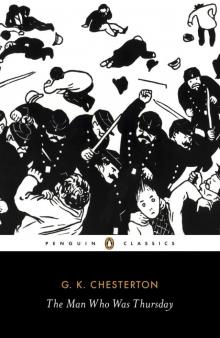 The Man Who Was Thursday: A Nightmare
The Man Who Was Thursday: A Nightmare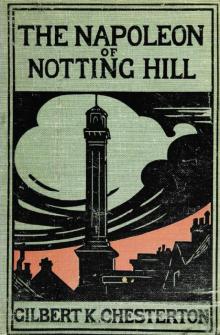 The Napoleon of Notting Hill
The Napoleon of Notting Hill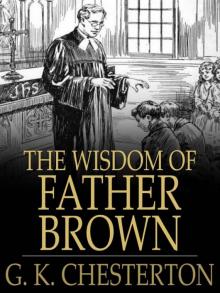 The Wisdom of Father Brown
The Wisdom of Father Brown G K Chesterton- The Dover Reader
G K Chesterton- The Dover Reader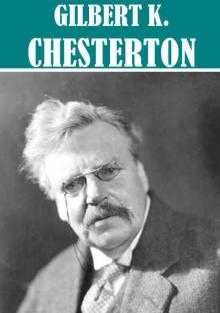 The Essential G. K. Chesterton
The Essential G. K. Chesterton The Trees of Pride
The Trees of Pride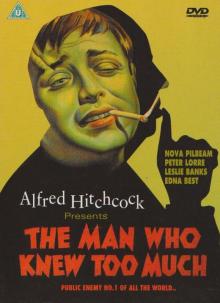 The Man Who Knew Too Much
The Man Who Knew Too Much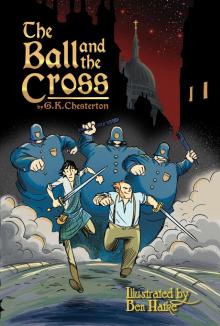 The Ball and the Cross
The Ball and the Cross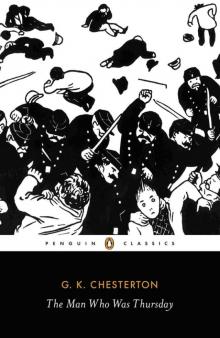 The Man Who Was Thursday (Penguin ed)
The Man Who Was Thursday (Penguin ed)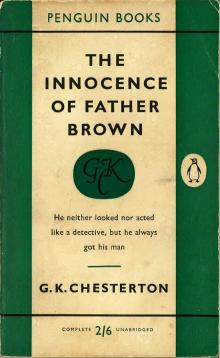 The Innocence of Father Brown
The Innocence of Father Brown The Victorian Age in Literature
The Victorian Age in Literature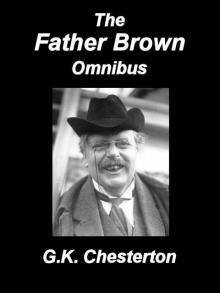 Father Brown Omnibus
Father Brown Omnibus Murder On Christmas Eve
Murder On Christmas Eve The Blue Cross
The Blue Cross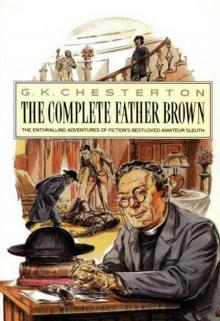 The Complete Father Brown Mysteries Collection
The Complete Father Brown Mysteries Collection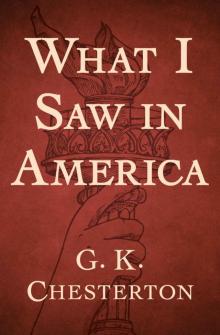 What I Saw in America
What I Saw in America